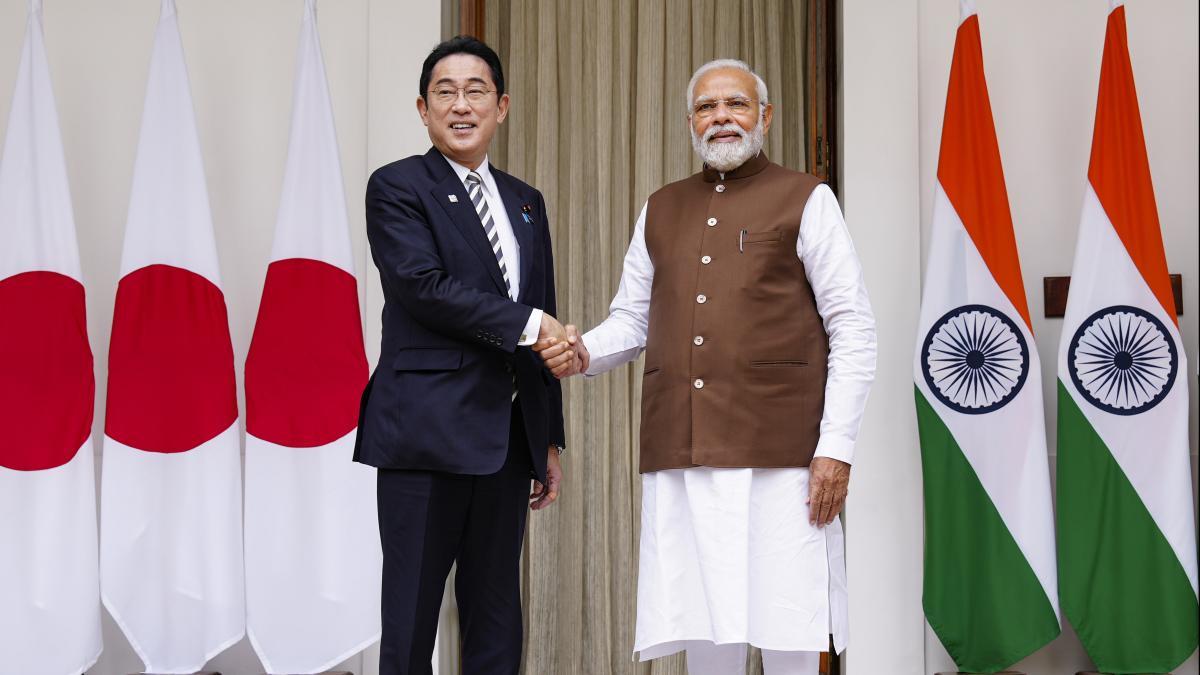Dr. Sudeep Kumar*
Indian Prime Minister Narendra Modi has steered India-Japan relations to new heights through his transformative foreign-economic policy and diplomatic initiatives. Under the Modi era (2014 onwards), the bilateral relations have flourished into a “Special Strategic and Global Partnership”. This achievement serves as a testament to the profound vision of Prime Minister Modi. At the core of this transformation lies three interconnected pillars: personal diplomacy, shared values, and strategic convergence.
The driving force behind this partnership lies in the power of personal connections. Modi cultivated a warm rapport with Japanese leaders, including Japan’s longest-serving prime minister, Shinzo Abe. Abe’s historic visit to Ahmedabad in 2016, and Modi’s significant participation in the “G20 Osaka Summit” and “G7 Hiroshima Summit” fostered mutual trust and strengthened multifaceted cooperation. This personal connection also resonated at the people-to-people level through educational & cultural exchanges and joint business ventures. Indian culture and cinemas further solidified this human connection, creating a common ground for creating a bridge between the two ancient civilizations of the world.
Beyond personal ties, a shared vision for a “Free, Open, and Inclusive Indo-Pacific” (FOIIP) cemented their partnership. Both India and Japan uphold the principles of “liberal democracy”, “freedom of navigation” and the “rule of law” for maintaining peace, prosperity and stability in the region. This shared vision led to collaboration on crucial issues like maritime security, counter-terrorism, and regional stability. Both militaries have actively cooperated in safeguarding the maritime routes by conducting joint naval exercises, sharing intelligence, and promoting freedom of navigation in the region.
The alignment of national interests further solidifies their mutual concerns regarding the Chinese assertiveness in the region, which resulted in deeper cooperation in crucial areas like defence, intelligence sharing, and maritime patrols. The 2+2 Ministerial Dialogue format, established in 2019, has become a key platform for strategic coordination, while joint military exercises like “Dharma Guardian” and “Malabar” demonstrate the growing operational synergy between them.
India and Japan signed the Acquisition and Cross-Servicing Agreement (ACSA) on the 9th of September, 2020, which facilitates logistical support for military cooperation, which enables their armed forces to extend supplies and services during joint military exercises, and disaster relief operations. This military cooperation ensures regional stability and empowers both nations to play a more important role in shaping the future of the Indo-Pacific.

Picture Source: DD News
The economic engine of this partnership has been remarkably successful. Despite the Comprehensive Economic Partnership Agreement (CEPA), there was a stalemate in bilateral trade. In 2016, the signing of the India-Japan civil nuclear pact eliminated Japan’s resistance to the Indian nuclear program, which triggered a surge in bilateral trade, exceeding US$21 billion in 2022-23. Japanese investments soared in sectors like automobiles, electronics, and infrastructure. Prime Minister Modi’s focus on infrastructure development resonated with Japan’s expertise, leading to projects like the Delhi-Mumbai Industrial Corridor, the Mumbai-Ahmedabad High-Speed Rail Corridor, and the Dedicated Freight Corridors. These projects signify a milestone in connectivity for India’s economic growth and development.
India-Japan relations, as a partnership of the century, extend beyond bilateral interests and actively engage with regional and global issues. India and Japan are key players in the Quadrilateral Security Dialogue (QUAD), alongside the US and Australia, advocating for a Free and Open Indo-Pacific. Both nations cooperate on climate change, disaster relief, space security, and cyber security, showcasing their commitment to tackling global challenges. Moreover, the collaboration in emerging technologies like artificial intelligence, robotics, autonomous vehicles and renewable energy holds immense potential for both economies, driving innovation and sustainable development.
Prime Minister Modi’s proactive foreign policy and diplomacy acted as the catalyst for a transformative change in India-Japan relations. The personal touch, shared values, and strategic convergence have fueled a robust partnership that extends far beyond trade and investment. As both nations navigate the complexities of the 21st century, their cooperation will remain a vital force for stability and prosperity in the Indo-Pacific and beyond. This partnership stands as a shining example of showcasing the shared vision for shaping a more secure and prosperous future.
*The author has worked in the capacity of Research Fellow at the Indian Council of World Affairs, New Delhi.
Originally Published: SIS Blog, January 20, 2024
https://sisblogjnu.wixsite.com/website/post/modi-magic-powering-a-new-era-in-india-japan-relations
Posted on academics4namo with the authorization of the author


Leave a Reply